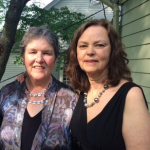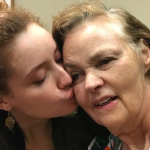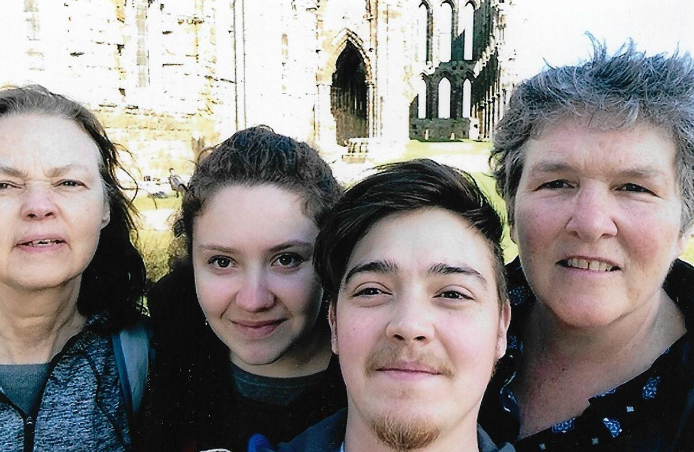Episode Description
Guest Bio:
Laura Barr
 Laura Barr is a long-time resident of Jamaica Plain, MA. She and her partner of 39 years, Jean O’Leary, have raised two amazing kids, Devin and Maddy, with the help of a wonderful community of friends/ Sadly, Jean was diagnosed with early onset Alzheimer’s in 2012, and Laura has spent the intervening years caring for her and trying to make the happiest life possible for both of them. Now that Jean is living in a skilled nursing facility, Laura continues to visit her regularly, and also takes short trips in her RV camper. She’s looking forward to retirement when she can hit the road with her adorable pup Panda.
Laura Barr is a long-time resident of Jamaica Plain, MA. She and her partner of 39 years, Jean O’Leary, have raised two amazing kids, Devin and Maddy, with the help of a wonderful community of friends/ Sadly, Jean was diagnosed with early onset Alzheimer’s in 2012, and Laura has spent the intervening years caring for her and trying to make the happiest life possible for both of them. Now that Jean is living in a skilled nursing facility, Laura continues to visit her regularly, and also takes short trips in her RV camper. She’s looking forward to retirement when she can hit the road with her adorable pup Panda.
Letter to Laura from Maddy, Laura and Jean's daughter...
To my mama Laura,
for my mama Jean
Merry Christmas
Maddy
 Arriving at Rogerson House, where my mother lives I cannot help but feel the awkward combination of dragging my feet and running to the door. No one should see their mother like this. The smell is strong and hits your nose as soon as you get off the elevator; an overwhelming and potent combination of cafeteria food, urine and decay. When I get to her though, the smell subsides for me. I see her face change when she sees me, often coming out of sleep or a blank stare, her face shines and her cheeks rise as a smile breaks out across her face, making her look years younger than she did a moment ago.
Arriving at Rogerson House, where my mother lives I cannot help but feel the awkward combination of dragging my feet and running to the door. No one should see their mother like this. The smell is strong and hits your nose as soon as you get off the elevator; an overwhelming and potent combination of cafeteria food, urine and decay. When I get to her though, the smell subsides for me. I see her face change when she sees me, often coming out of sleep or a blank stare, her face shines and her cheeks rise as a smile breaks out across her face, making her look years younger than she did a moment ago.
Our visits are predictable and for the most part I’m thankful for that. I push her wheelchair into a room away from everyone else, a small room with a round table and two windows and two large doors that I close so that we can play music and laugh without the interruption of anyone else. I ask her how she is, I tell her I love her and she tells me she loves me more. I feed her a treat, cake or a croissant or even sometimes ice cream. We laugh when I give her a bite that’s too big; she makes a face, the consummate entertainer. We listen to music, when it’s just her and I we listen to Beyoncé and Kendrick Lamar. She sings along still, she dances as much as she can, her fingers fluttering around like a jazzy sign language; her face moves, as expressive as ever. When other people are there, they have a hard time that this is the music she likes. They put on oldies, which she also likes, but it’s never like it is when it’s just us. At the end, I tell her I love her and she tells me again that she loves me more and I respond with “I love you most.” I kiss her on the cheek and then turn my cheek to her so she can kiss it, which she always does. I tell her I’ll be right back and she beams at me as I walk away, always leaving another small piece of my heart. I take the elevator back up and step out into the fresh air, something that should be refreshing, is refreshing, but always breaks me a little more each time.
One Wednesday I went to visit her. I smelled the smell, she smiled when she saw me, I brought her, her favorite ice cream, coconut almond chip. I wheeled her into our room and closed the doors. We laughed and talked and I asked her how she was and she told me she was good. For some reason my heart was heavier than usual and when she smiled at me my eyes welled and my lip trembled. I kept smiling, always smiling so that she could too. Somehow, this brilliant woman who now misses so much, caught it. She stopped smiling and looked at me like only a mother could.
“Are you okay?” She has not asked me this question in years, does not have the wherewithal. It caught me off guard. I opened my mouth to tell her of course, but the words did not come out. Instead my face crumbled and my eyes flooded with tears. I stood quickly so that she couldn’t see, but again she knew. “Maddy, no!” Again, I had not heard her speak so directly in a long time. I came back to her, pulling my chair as close to hers as I could, I sat and held her hand, my face screwed up as I tried to stop the tears streaming down my cheeks. She moved in a way I had forgotten. She sat up in her chair, her face was full of compassion and concern, emotions no one had told her to have. She squeezed my hand, putting her forehead to mine. “You know I would do anything to make you happy.” Her voice was changed, the voice I remembered from my childhood, strong and honest, Jean. My tears continued, falling onto her cheeks instead of mine. “It’s going to be okay, honey.” She cooed, a mother fully, the mother I missed so desperately, the mother I came to visit every week in hopes of a glimpse of her while ‘Blue’ played in the background. “I love you so much.” She repeated these two phrases as a mantra as I laid my head on her chest and she tucked it under her chin, her hand still squeezing mine. We stayed like this for a prolonged moment. I let myself cry into her, soaking her shirt as she continued to comfort me. “It’s going to be okay, honey. Everything’s going to be okay. I love you so much.”
Finally, I sat up, knowing that if I didn’t stop then, I never would. I wiped my eyes and laughed.
“Sorry about that, mama.” She smiled at me, one last moment of my mother Jean, the most beautiful face, a smile full of comfort and love and fierce independence. Then I saw her go away. Her eyes faded, her expression faltered. She reached out to the table, trying to grab the edge, unsuccessfully inspecting it. I fed her the end of the melting ice cream. We made a few more jokes and I saw a bit of her trying to make me laugh. Eventually I opened the doors to the room, breaking our little universe. I started to push her back to the main room, but she turned to me.
“You cried.” This was a recall she no longer had and again it caught me off guard.
“I did, I’m sorry, mom.”
She smiled at me.
“It was nice.”
I smiled back and agreed; amazed by the many things that afternoon had shown me.
I pushed her back to the main room, an aide played music and I felt comfort in leaving her with an activity.
“I love you, mama.”
“I love you more.” She grinned.
“I love you most.” I grinned back. “Bye mama, I’ll be back soon, okay?”
“Bye.” She looked up at me, our eyes locked, her expression piercing. “I’ll see you in another world, babe.”
I kissed her cheek hard and tried to keep it together as I walked down the hall, rode up the elevator and stepped out into the fresh air with the understanding that my mama had just told me goodbye.

Guest Bio:
Dr. Adam Burrows
 Dr. Adam Burrows has been the Medical Director of Upham’s Corner PACE, the PACE (Program of All-inclusive Care for the Elderly) organization of the Upham’s Corner Health Center, since its inception in 1996 and has guided the program’s expansion to three PACE Centers serving older adults throughout the city of Boston. Dr. Burrows has been active nationally in promoting and supporting integrated models of community-based care for frail and disabled older adults, serving as chair of the National PACE Association’s Primary Care Committee, editor of the PACE Medical Director’s Handbook, health services consultant for the Rural PACE Project, and member of the National PACE Association Board of Directors, where he is the first physician to serve as chair. Dr. Burrows developed and chairs the Rural PACE Ethics Committee and is a long-standing member of the Massachusetts PACE Ethics Committee. Dr. Burrows is a graduate of the Mount Sinai School of Medicine and completed his medical residency at Boston City Hospital, chief residency at the Boston VA Medical Center, and geriatric fellowship at the Harvard Division on Aging. He is a member of the Boston University Geriatrics faculty and Assistant Professor of Medicine at the Boston University School of Medicine where he twice received the Department of Medicine’s annual Excellence in Teaching Award for community-based faculty. Dr. Burrows is board-certified in Internal Medicine and Geriatric Medicine.
Dr. Adam Burrows has been the Medical Director of Upham’s Corner PACE, the PACE (Program of All-inclusive Care for the Elderly) organization of the Upham’s Corner Health Center, since its inception in 1996 and has guided the program’s expansion to three PACE Centers serving older adults throughout the city of Boston. Dr. Burrows has been active nationally in promoting and supporting integrated models of community-based care for frail and disabled older adults, serving as chair of the National PACE Association’s Primary Care Committee, editor of the PACE Medical Director’s Handbook, health services consultant for the Rural PACE Project, and member of the National PACE Association Board of Directors, where he is the first physician to serve as chair. Dr. Burrows developed and chairs the Rural PACE Ethics Committee and is a long-standing member of the Massachusetts PACE Ethics Committee. Dr. Burrows is a graduate of the Mount Sinai School of Medicine and completed his medical residency at Boston City Hospital, chief residency at the Boston VA Medical Center, and geriatric fellowship at the Harvard Division on Aging. He is a member of the Boston University Geriatrics faculty and Assistant Professor of Medicine at the Boston University School of Medicine where he twice received the Department of Medicine’s annual Excellence in Teaching Award for community-based faculty. Dr. Burrows is board-certified in Internal Medicine and Geriatric Medicine.
Articles about the impact of Alzheimer's Disease on Caregivers
Alzheimer’s Disease and Caregiving, Family Caregiver Alliance
Caregiver Stress, Alzheimer’s Association
Impact of Alzheimer’s Disease on Caregivers, American Senior Communities, 10.14
Alzheimer’s Disease and Family Conflict, Mayo Clinic
Fighting Alzheimer’s as a Family in Conflict, by Barry Jacobs, AARP, October 18, 2018
Resources
Help for Alzheimer’s Caregivers, Support, resources, advice for a difficult, draining job
by Chris Woolston, AARP Bulletin, October 18, 2010
Alzheimer’s Association
The Alzheimer’s Association works on a global, national and local level to provide care and support for all those affected by Alzheimer’s and other dementias. They offer help through a professionally staffed 24/7 Helpline (1.800.272.3900), face-to-face support groups and educational sessions in communities nationwide, and comprehensive online resources and information through the Alzheimer’s and Dementia Caregiver Center
Alzheimer’s Foundation of America
The Alzheimer’s Foundation of America offers a national, toll-free helpline (866-232-8484) staffed by licensed social workers, educational materials, a free quarterly magazine for caregivers and “AFA Partners in Care” dementia care training for healthcare professionals. For more information about AFA, call 866-232-8484, visit www.alzfdn.org.
The Association for Frontotemporal Degeneration (AFTD)
AFTD promotes and funds research into finding the cause, therapies and cures for frontotemporal degeneration. They also offer information, education and support to persons diagnosed with an FTD disorder, and for their families and caregivers. To learn more about AFTD, visit www.theaftd.org
The Lewy Body Dementia Association (LBDA)
LBDA works to raise awareness of Lewy body dementias (LBD), promoting scientific advances, and supporting people with LBD, their families, and caregivers. LBD is a complex disease that can present a range of physical, cognitive, and behavioral symptoms. It dramatically affects an estimated 1.4 million individuals and their families in the United States. To learn more, visit www.lbda.org
Alzheimers.gov – For the People Helping People with Alzheimer’s
Resources from the Administration for Community Living on Alzheimer’s disease and other forms of dementia.
National Institute on Aging: Alzheimer’s Disease Education and Referral Center
Resources from the National Institutes of Health on Alzheimer’s disease and other forms of dementia, including information on clinical trials and current advances in scientific research.
U.S. Department of Veterans Affairs: Dementia Care (including Alzheimer’s)
For those caring for a Veteran, resources on dementia care through the VA and information on new research on dementia in Veterans.
U.S. Department of Veterans Affairs: Dementia Care (including Alzheimer’s)
For those caring for a Veteran, resources on dementia care through the VA and information on new research on dementia in Veterans.